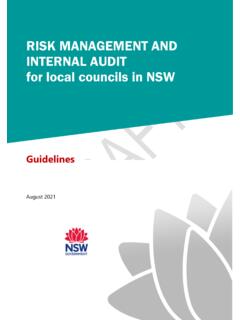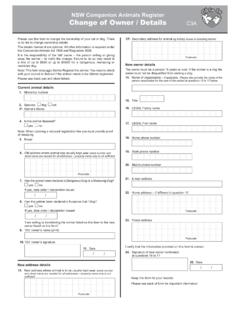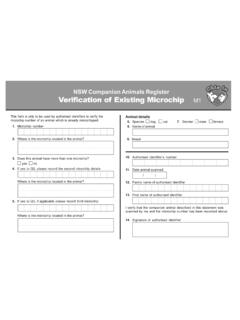Transcription of Tendering Guidelines for NSW Local Government
1 Tendering Guidelines for NSW Local Government October 2009 1 Tendering Guidelines for NSW Local Government These Guidelines are prepared by the Director General under section 23A of the Local Government Act 1993. Councils are required to take Guidelines issued under this section into consideration before exercising any of their functions. NSW Department of Premier and Cabinet Division of Local Government OCTOBER 2009 Tendering Guidelines for NSW Local Government October 2009 2 ACCESS TO SERVICES The Division of Local Government is located at: Levels 1 & 2 5 O Keefe Avenue Locked Bag 3015 NOWRA NSW 2541 NOWRA NSW 2541 Phone 02 4428 4100 Fax 02 4428 4199 TTY 02 4428 4209 Level 9, 323 Castlereagh Street Locked Bag A5045 SYDNEY NSW 2000 SYDNEY SOUTH NSW 1235 Phone 02 9289 4000 Fax 02 9289 4099 Email Website OFFICE HOURS Monday to Friday to (Special arrangements may be made if these hours are unsuitable) All offices are wheelchair accessible.
2 ALTERNATIVE MEDIA PUBLICATIONS Special arrangements can be made for our publications to be provided in large print or an alternative media format. If you need this service, please contact our Executive Branch on 02 9289 4000. NSW Division of Local Government , Department of Premier and Cabinet 2009 ISBN 1 920766 83 9 Produced by the Division of Local Government , Department of Premier and Cabinet Tendering Guidelines for NSW Local Government October 2009 3 Definitions In the Tendering Guidelines for NSW Local Government the following definitions apply: Council Official includes councillors, members of staff of council and delegates of council The Act the Local Government Act 1993 The Regulation the Local Government (General) Regulation 2005 Tendering Guidelines for NSW Local Government October 2009 4 Table of Contents 1.
3 Guiding Principles .. 9 9 Standards of Behaviour and Ethical Principles .. 10 Confidentiality .. 11 Conflict of Interests .. 12 Value for Money .. 14 Local Preference Policy .. 14 Aboriginal Employment Participation .. 15 2. Procurement Management .. 17 Quality 17 Record 18 Risk 20 Roles and 20 In-House Tenders .. 22 Joint Purchasing 23 3. The Tendering 25 When is a tender required? .. 25 Identification and 26 Identifying and Defining the Tender 27 Functional 28 User 28 Types of 28 Developing the Evaluation Criteria.
4 30 Selecting the Tendering Method .. 31 Open Tenders .. 32 Selective 33 Invitation to tender after asking for Expressions of Interest (EOI) .. 34 Invitation to tender to recognised contractors on council s list .. 35 Developing the Tender Documents .. 37 Shortened Tender Period .. 40 Extending the Tender Period .. 41 Communication with Tenderers .. 41 Submission of Tenders .. 43 Custody of 45 Opening of Tenders .. 45 Communication with Tenderers after Close of Tender .. 46 Variations to Tenders .. 47 Consideration of 48 Consideration of Late Tenders.
5 51 Report to Council of Tender Evaluation .. 52 Acceptance or Rejection of Tenders .. 54 Notifying the Outcome of the Tender .. 55 Tender 56 Debriefing of Tenderers .. 58 Develop the Contract .. 58 Prescribed Organisations .. 59 Tendering Guidelines for NSW Local Government October 2009 54. 60 Tendering checklist .. 60 Legislative Summary checklist .. 63 Recommended Reading .. 63 NSW Government Guidelines .. 63 Probity issues .. 64 Waste and 64 Other .. 64 Commonly Used Terms in Tendering and 65 Tendering Guidelines for NSW Local Government October 2009 6 Introduction Tendering and the activities of procurement and disposal are important areas of council operations.
6 Economic forces and technological change over the last 20-30 years have led to circumstances where organisations are spending more and more on the purchase of goods and services and the disposal of property. Local councils are no exception to this general rule. The development of best practice in Tendering is not a simple matter and may be affected by a range of factors including the scale of the organisation, the degree of commitment by senior management or the level of purchasing expertise within an organisation. While the current Tendering threshold provided in the Act and Regulation is $150,000, councils should consider whether to conduct a tender process when a lesser amount is involved to ensure that they obtain best value (see part ).
7 Management of the Tendering process is, or at least should be, an integral component of almost every aspect of the management of any organisation, including Local and county councils. It should involve everybody, from councillors and managers to those responsible for on-ground delivery of services. Purchase and disposal activities using the Tendering process for Local Government , and other Government agencies, are governed by strict considerations of probity, transparency and accountability in the expenditure of public funds for public purposes. As part of the Division of Local Government s aim to encourage and support the spread of best practice, it has produced these Tendering Guidelines for NSW Local Government .
8 The Guidelines aim to assist councils in applying clear policies, consistent procedures and effective risk management strategies in accordance with the Local Government Act 1993, the Regulation and other relevant legislation. Tendering Guidelines for NSW Local Government October 2009 7 They are prepared by the Director General of the Department of Premier and Cabinet under section 23A of the Act and therefore must be considered by councils as part of the Tendering process. The Guidelines strengthen previous publications regarding Local Government procurement, namely the Code of Practice and Code of Tendering for the Construction Industry Practice Note No.
9 8a (1996) and Competitive Tendering Guidelines (1997), as well as various State Government codes and Guidelines regarding public procurement for the disposal and the delivery of goods and services to meet Local community needs. The use of these Guidelines will reduce the risk to Local Government in any Tendering undertaken and should be used within the context of the Act and Regulation. Councils should be mindful that they must act in the interests of their residents, ratepayers and the wider community and that, when considering expenditure of public monies, they: Are open, transparent and accountable in their dealings.
10 Ensure that their dealings promote fairness and competition, and Obtain best value The Tendering Guidelines for NSW Local Government are divided into the following sections to assist councillors, council staff and business: Section One Guiding Principles sets out the overall principles that apply to the Tendering process used by NSW Local Government . Section Two Procurement Management - outlines processes necessary to effectively manage the Tendering process Section Three - The Tendering Process outlines the stages involved in the Tendering process with reference to specific legislative requirements and recommended practices Tendering Guidelines for NSW Local Government October 2009 8 Section Four Resources provides useful publications, websites and contacts as well as a Tendering checklist and list of commonly used terms in Tendering , the purchase of goods and services and the disposal of property.









